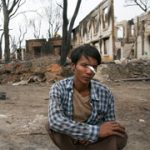The Office of the U.S. Trade Representative recently announced two new solar energy power plants slated for construction in the Mandalay region of Burma. One of these projects, funded by a U.S. private equity fund, is to be completed in the district of Meiktila, where a series of human rights violations were committed against Muslims last year.
While investment in Burma’s infrastructure is welcome, support for development without also addressing accountability and reconciliation perpetuates impunity for perpetrators of human rights violations. Actors both in and outside of Burma bear the responsibility of ensuring that development does not supersede justice for victims of abuse.
In March 2013, groups of armed men from the majority Buddhist population reportedly set fire to more than 1,500 homes, destroyed more than a dozen mosques and three madrassas, and killed more than 100 people among the minority Muslim population in and around Meiktila. Following this violence, Physicians for Human Rights (PHR) conducted a field investigation, and – based on interviews with eyewitnesses – found that various human rights violations had occurred after an alleged killing of a Buddhist monk at a gold shop on March 20, 2013.
In the days that followed, armed groups of Buddhists burned down an Islamic boarding school, attacked women and children seeking refuge in a residential compound, and massacred unarmed Muslims. Eyewitnesses reported that Muslims were forced to eat pork and pray in the Buddhist manner; they were assaulted with sticks, pipes, bricks, stones, knives, and swords; and others were murdered – some being burned alive. Meanwhile, police stood by, doing little or nothing to intervene, in violation of Burma’s own penal code, as well as the UN Code of Conduct for Law Enforcement Officials.
PHR corroborated witness testimony with several other forms of documentation, including visual verifications of locations of reported human rights violations; reviews of photographic, video, and satellite evidence; and physical and psychological evaluations of survivors. Despite this evidence, those who organized these crimes in Meiktila have not been held to account.
More than a year later, the U.S.-based ACO Investment Group and the Burma Ministry of Electric Power have made an agreement to develop two large solar-energy plants in the region. The project is valued at $480 million and is considered by the U.S. government to be a “responsible investment.” However, before the U.S. government invests in Burma in the name of development, it must first prioritize accountability for crimes that have gone unaddressed.

